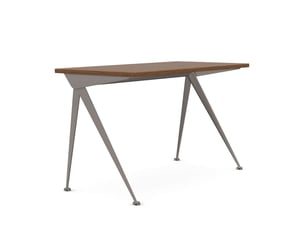Charles and Ray Eames, creative chemistry
The creative and professional chemistry of Charles and Ray Eames made them pioneers of a sophisticated, modern and functional design that was also extremely straightforward and simple. With their experimental approach and careful attention to the consumer, the Eames became the leading figures of 20th-century design, creating authentic icons and shaping new visionary concepts that are now archetypal elements of any home. A priceless, creative, aesthetic and technological legacy that still inspires us today.


Charles Eames, an architect born in St. Louis in 1907, and Berenice Alexandra "Ray" Kaiser, an abstract painter born in Sacramento five years later, met in Michigan, in the 1930s, at Cranbrook Academy of Art, where Charles was the director of the industrial design program and a friend of Eero Saarinen. Ray studied art and assisted Saarinen in entering a design competition announced by MoMa in New York.


On this occasion, the lives of these two different yet very similar personalities intertwined for the first time: Charles, passionate about techniques and materials, and Ray, with a strong aesthetic sensibility. Combining creativity, technology, design, and architecture, this visionary couple produced unique and functional furniture, creating groundbreaking icons of 20th-century design history.

After their marriage, the Eames' moved to Los Angeles. They began experimenting with new plywood molding techniques to create intricate furniture forms. During World War II, they pivoted their plywood manufacturing to aid in the war efforts: this secured them government funding and cutting-edge means of production. Plywood prototypes started to appear after the war, like the LCW Lounge Chair Wood.

The breakthrough was finally achieved when Herman Miller took over mass production of the designs exhibited at MoMa in 1946. The Eames' experimented with innovative techniques and introduced new materials, including fiberglass for La Chaise, which was designed in 1949 (but produced several decades later); moulded plastic for the Eames Plastic Chair, characterised by a one-piece seat shell that perfectly accommodate the human body, and a combination of metal with other materials (like the LTR Low Rod Table).


In 1956, after years of experimentation, the iconic Lounge Chair & Ottoman, an armchair with rosewood and metal seat shell and leather upholstery, was finally introduced to the public. Extraordinary and elegant, it represents the only exception to the Eames' motto "highest quality at the lowest price". An undisputed and timeless icon of design, the famous armchair is now on display in more than twenty museums around the world.

In 1957, Vitra began producing the Eames' designs for Europe and the Middle East. The brand's encounter with the creations of the Eames further inspired Vitra's general production activity, whose values, direction and goals perfectly matched the philosophy of design.

“Recognizing the need is the primary condition for design.“
Charles Eames
Charles Eames died in 1978. Ray Eames devoted the following years to the organisation and popularisation of their extensive and diverse production. She died in 1988.


The couple's home in Los Angeles, the Eames House, is Charles and Ray's most famous architecture project: combining a living space and a working space, this home design is characterised by modern lines that seamlessly blend in with the surrounding nature.

“What works good is better than what looks good because what works good lasts.”
Ray Eames
We turn your inspiration into a project
We help you shape your home, collecting the best inspirations for you and editing design selections that fit your space and needs.






























